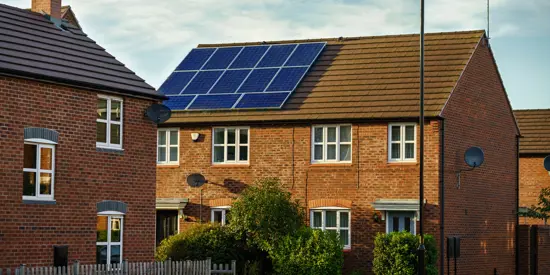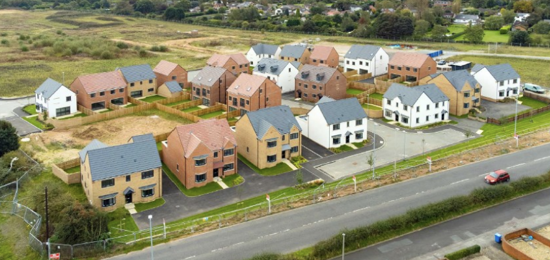Martin’s market musings, 2023 edition - Reckoning or reset?
The timing and manner will have been different for each of us, but 2022 was a year of ‘penny drop’ moments. For some it was the return of war to Europe and inflation’s spike into double digits, for others it was the rapid rise in the Bank of England’s base rate, which in just 12 months has jumped from near zero to its highest level in 14 years.
For the generation of real estate professionals who’ve never known anything other than the era of rock-bottom interest rates – which began as an emergency response to the global recession of 2008-9 and then never ended – this all feels unfamiliar and unsettling.
2023 will be the year that the full impact of these rapid changes is felt. The Bank of England estimates that four million UK households will face a higher monthly mortgage bill next year as a direct result of the jump in interest rates.
For property developers and those of us who provide the finance they need to buy land and build homes, the ripple effects will be more complex and nuanced. They will bring challenges but also great opportunities as capital chases the best quality schemes. Here are the key themes to watch for:
Rates will keep rising, but not as high as feared: Economists continue to debate the nature of Britain’s inflationary problem and how high interest rates will need to go to contain it. But after CPI cooled in November, some are daring to hope that inflation may have peaked. In response, forecasts for the benchmark SONIA rate have been pared back. It’s now predicted to peak at 4.57% in August, which though high by post-2008 standards, would have been unremarkable in the preceding decades.
Nevertheless, for developers looking for certainty of cost, the case for borrowing at a fixed interest rate is compelling. Atelier is committed to providing a comprehensive, and highly competitive, range of finance options, and that’s why we kept all our fixed interest rates unchanged following the base rate rises in both November and December.
Demand for homes will cool: The slowing economy, coupled with reduced affordability and the end of Help to Buy, will squeeze homebuyer demand in 2023. With Savills predicting a 10% fall in house prices over the year, an equally serious concern for developers could be a fall in transactions. First-time-buyers, rightly seen as key to the market, are the most exposed to rising mortgage costs as they have the least equity; if they stay away the whole market could get stickier.
Nevertheless improving value will bring out tactical buyers, so developers who build the right homes in the right locations should do well. Understanding the sort of buyers that an area attracts – and the sort of home they want – will be more vital than ever.
Land values will fall, but not far enough: Higher interest rates, elevated construction costs and softening buyer demand will all squeeze residual values – meaning that many deals that might have looked great six months ago no longer stack up. Land values have begun to cool in response, as landowners have their own ‘penny drop’ moment.
Anecdotal evidence suggests land values in some areas have already dipped by 10%, and this is welcome. But with developers’ profit margins likely to come under sustained pressure over the next 12 months, land values, cost assumptions and project fundamentals will need scrutinising like never before.
Less lending, lower LTVs: The rising cost of capital will make life harder for development lenders who lack a strong liquidity profile and a robust balance sheet. As a result, the market should expect to see a fall in both the volume of lending and in typical LTVs. Many institutional lenders are already adopting a highly cautious approach, limiting themselves to lower LTVs and reining in their lending appetite, while at the other end of the market some family offices have withdrawn from development lending entirely.
A market rationalisation is coming: The BAYS Business School estimates there are currently 400 lenders in the UK real estate market, up from just 180 in 2017. 2023’s challenging environment will not be kind to the poorly capitalised, smaller lenders. Some will become ‘zombies’, nominally open for business but never lending in practice, and others will retract from the market entirely.
Quality will seek quality: Capital will continue to flow into the sector from private equity firms that built up large cash reserves over the past few years and are now seeking longer-term, more stable returns than those offered by equities. As a result, liquidity for the best schemes will remain strong – though it’s likely that lender appetite will focus almost exclusively on top-tier locations. Schemes in secondary and tertiary areas may struggle to get a look in.
Energy efficiency will stay on everyone’s agenda: 2022’s energy crisis has transformed the way the property sector views energy efficiency. Even with the Government’s Energy Price Guarantee, the sheer cost of heating a home means that for many buyers, a high EPC rating has morphed from a ‘nice to have’ into a must-have. On the development front-line, we’ve already seen agile SME developers give themselves a market advantage by adapting to buyers’ increased appetite for ultra-energy-efficient homes.
Atelier is determined to make it easier and cheaper for more developers to build greener homes. That’s why 2023 will see us increase our Carbonlite Challenge lending, which offers a significant interest rebate to developers whose schemes pass a series of rigorous energy-efficiency and sustainability tests.
Queens Park Rangers will win promotion back to the Premier League (eventually): This time last year I boldly predicted that 2022 would see QPR return to English football’s top-flight. That forecast wasn’t so much wrong as premature, with my beloved club still requiring a further period of consolidation and reflection.
As a long-suffering season ticketholder at Loftus Road, I’m fond of quoting John Cleese’s character in the film Clockwise: “It's not the despair. I can take the despair. It's the hope I can't stand.” Argentina fans probably said the same thing after they lost to Saudi Arabia in their first match at this year’s World Cup. And look how that turned out.


